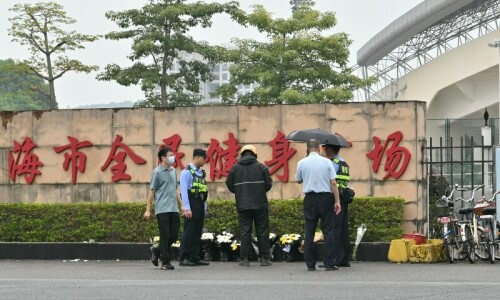DUBAI: Two Saudi women detained for nearly a month in defiance of a ban on females driving were referred on Thursday to a court established to try terrorism cases, several people close to the defendants said.
The cases of the two, Loujain al-Hathloul and Maysa al-Amoudi, were sent to the anti-terrorism court in connection to opinions they expressed in tweets and in social media, four people close to the two women told The Associated Press.
They did not elaborate on the specific charges or what the opinions were. Both women have spoken out online against the female driving ban.
Activists say they fear the case is intended to send a warning to others pushing for greater rights. The four people spoke on condition of anonymity because of fear of government reprisals.
The Specialized Criminal Court, to which their cases were referred, was established in the capital Riyadh to try terrorism cases but has also tried and handed long prison sentences to a number of human rights workers, peaceful dissidents, activists and critics of the government.
For example, this year it sentenced a revered cleric Sheikh Nimr al-Nimr, a vocal critic of the government, to death for sedition and sentenced a prominent human rights lawyer, Waleed Abul-Khair, to 15 years in prison on charges of inciting public opinion.
Human Rights Watch recently warned that “Saudi authorities are ramping up their crackdown on people who peacefully criticise the government on the Internet.”
It said that judges and prosecutors are using “vague provisions of a 2007 anti-cybercrime law to charge and try Saudi citizens for peaceful tweets and social media comments."
This was the first time women drivers have been referred to the court, activists said. The detention of al-Hathloul and Maysa al-Amoudi, both arrested on Dec. 1, has been the longest yet for any women who defied the driving ban.
They were vocal supporters of a grassroots campaign launched last year to oppose the ban, and have a significant online following with a total 355,000 followers on Twitter for the two of them at the time of their arrest.
Though no formal law bans women from driving in Saudi Arabia, ultraconservative Saudi clerics have issued religious edicts forbidding women from taking the wheel, and authorities do not issue them driver's licenses.
No such ban exists anywhere else in the world, even in other conservative Gulf countries. The four people close to the women said their lawyers appealed the judge's decision to transfer their cases.
An appeals court in Dammam, the capital of Eastern Province, is expected to decide on the referral in the coming days, they said.
Authorities have a history of clamping down on Saudi women who attempt to drive. In 1990, 50 women were arrested for driving.
They had their passports confiscated and lost their jobs. More than 20 years later, a woman was sentenced in 2011 to 10 lashes for driving, though the king overturned the sentence.
Supporters of the current driving campaign delivered a petition to the royal court this month asking King Abdullah to pardon the two women.
Organizers behind the campaign, which began Oct. 26, 2013, say the ban on women driving underpins wider issues related to guardianship laws in Saudi Arabia that give men powerful sway over women's lives.
One activist said the driving ban is also part of “a wider effort to quash any chances of raising the ceiling on civil liberties” in Saudi Arabia.
The two women appeared in court on Thursday for the second time in the eastern al-Ahsa region, where they were detained after driving to Saudi Arabia from the United Arab Emirates.
Al-Hathloul was stopped by border guards and her passport was confiscated for more than 24 hours when she attempted to cross the border Nov. 30 with a UAE driver's license in an act of defiance.
Al-Amoudi, a UAE-based Saudi journalist, was stopped when she went to deliver food and a blanket to al-Hathloul at the border, activists and relatives said.
The women were formally arrested on Dec. 1. There has been no official Saudi comment on the arrests.
Al-Hathloul is in a correctional facility for juveniles and al-Amoudi is in a prison. Relatives say they have been allowed to see them for short supervised visits.











































